We’re living at a historical point of disruption which contains both great peril and promise.
The stalled engine of neoliberal growth, bankrupted political leadership, deepening inequalities in wealth and power, ongoing racist and patriarchal violence, and the fierce urgency of the ‘ecological now’ delimit the terrain upon which we need to contest our future. Against a backdrop of a rising far right, big data, and the ongoing consolidation of unaccountable power by elite groups, we have a lot to do to contest our future. Now is the time for something new to emerge.

The Movement Learning Catalyst Year-Long+ Programme is a training and action-learning initiative aimed at strengthening the ecology of social movements and enhancing capacity for transversal and transnational organising.
In late 2021, we engaged activists involved with more than 100 organisations across Europe, to ask them about the key challenges their movements and organisations were facing. Most pointed to fragmentation, persistent divisions within and between movements, and a lack of movement capacity for longer-term and coherent strategy.
Responding to these challenges, we have developed a training programme which aims to build capacity for initiatives that are transversal and transnational in nature, able to connect across issues, communities, and socio-political cultures – supporting the building of the kinds of impactful social movement alliances required to achieve the depth of structural transformation we need today.
MORE THAN JUST A TRAINING
The programme is more than a training. It is designed as a transversal movement building project – connecting different struggles and communities across issues, strategic approaches, and localities. The course places deep reflective action-learning and the building of solidarity-based relationships at its core. It aims to model and evolve transversal and transnational movement building practices, while strengthening our capacity to embed learning across our different movements’ practices, so we can continue to learn from experience, design creative and testable interventions, and build strategic approaches that can respond to the ever-changing conditions we struggle within.
Through our work in activist education, we have witnessed the value of critical learning spaces for building the kind of relationships needed to underpin more effective transversal movement initiatives. Too often, when people from different organisations, networks, or movements come together, they each bring their often-competing agendas, preferences and often prejudices about each other. The scope for finding new and transformative ways of working across our differences under these conditions can be limited. In contrast, in spaces for learning, supported by effective facilitation, we find that it becomes far easier to develop a higher level of respectful interest, curiosity, and openness – even the sense of shared purpose and solidarity needed for creating the transversal movement connections we need today.
The course will inquire deeply into how our organisations and networks relate to the wider ecology of activism within our movements – and how these movements relate to wider struggles in the ever changing cultural, socio-political and ecological context. Participants will engage in deep analysis of their own movement practice and movement ecology. They will have opportunities to explore and develop skills and understanding related to bridge building within and between movements and give attention to the opportunities and challenges of transnational movement building.
A short description of the programme can be found here.
WHO IS IT FOR?
It is aimed at experienced activists and organisers involved in movement thinking and practice from across Europe who:
– Have substantial personal history of social movement engagement and experience to share with each other
– Are embedded in organisations or networks that can benefit from thinking strategically about their place in social movements
– Are well placed to bring new learning and strategic thinking back to their organisations or movements
– Understand what is at stake at this time and care passionately about developing social movement alliances on a scale capable of winning
– Recognise the importance of developing our capabilities to organise transversally, across multiple forms of difference within and between our movements
– Are conscious of the importance of translocal and transnational dimensions of organising today.
We will select participants from the applications to bring together a range of people from diverse movements and contexts across Europe to share and learn from each other. Wherever possible, we encourage participants to take part in pairs or small groups from the same organisation or network, so as to create learning partnerships that can support action learning and implementation.
WHO WILL RUN IT?
This hybrid programme has grown out of several flagship trainings: Ulex Project’s Ecology of Social Movements, the Citizen Participation University that the European Community Organising Network contribute to, the National University of Ireland Maynooth’s MA in activism, and European Alternatives’ School of Transnational Activism. We will draw on a wide network of diverse organisers and trainers to bring a wide range of experience and perspectives.
COURSE STRUCTURE
This programme will be designed with the participant cohort and tailored to their context and needs. Recognising that activists and organisers face a wide range of challenges, have different access to resources, and diverse demands on time and energy, we are designing this programme to be adaptable to these different contexts and to support accessibility. We will offer multiple components and resources, which can be tailored to support optimal levels of participation and value for those involved.
The first year of the programme will support a cohort of 40-60 activists from across Europe through a blend of online and in-person training to:
– Bring together experienced trainers and organiser/activists to work on key movement building themes and issues using a well-crafted framework for ongoing action learning, coaching, and peer-to-peer inquiry
– Develop collective capacity for long-term strategic projects that can respond to crisis and change
– Build relationships within the learning space across organisations and movements, seeding new transversal and transnational initiatives
– Embed structured action-reflection learning within their activist practice to enhance long-term movement strategy and collaborative enquiry.
LEARNING ACTIVITIES
This programme will be designed with participants and tailored to their specific context and needs. It starts from the challenges their movement or organisation is facing related to transversal and/or transnational organising in a specific project or initiative. The learning cohort will be able to select among multiple learning components and resources online and offline to support their learning needs.
On-line Modular Curriculum and Seminars: Online seminars or workshops on different topics with live and pre-recorded elements so that participants can select modules relevant to their needs.
International Residential Trainings: We will offer in-person residential trainings connected to Ulex Project’s Ecology of Social Movements training.
Regional Gatherings: We will offer in-person learning opportunities through short regional gatherings based on the geographical spread of participants.
Peer-to-Peer Learning Circles: We will create circles of 5-6 participants and provide a structured space for ongoing inquiry and reflection into live issues and current practice using a peer coaching method and a forum space.
Visits: We will support participants to visit each other in different settings to get a clearer sense of diverse working contexts and cultures.
Personal Mentoring: We’ll offer one-to-one mentoring where requested, with regular check-ins, either in person regionally or virtually.
COSTS AND SOLIDARITY ECONOMY
We’ll operate the programme in the spirit of a Solidarity Economy and we’re committed to challenging economic marginalisation and exclusion. We want to enter into relationship with you as co-producers and collaborators in the joint project of movement building. There will be no charge for any elements of the programme. We will ask all participants or their sending organisations to consider making a financial contribution towards the running costs of the programme in the range of €500/€1500/€4000. Where activities involve travel and other costs, if participants or organisations can cover these costs themselves, we ask that they do so. However, inability or unwillingness to make a contribution will not preclude anyone from participating. Where participants cannot cover costs, we will engage in fundraising to help create bursaries to cover these costs.
APPLICATION AND TIMEFRAME
Deadline to apply: November 30th 2022
October to December 2022: Recruiting participants, conducting needs analysis, and refining the programme based on participants’ needs and experience
January to December 2023: 12-month core action learning programme
2024 and beyond: We hope to build on the community created and expand the action-learning and organising network.
To apply or send inquiries, please write to events@ulexproject.org to receive links to application forms or info about the programme.
READ MORE ABOUT THE PROJECT HERE.
Tens of thousands of refuge-seekers continue to die preventable deaths at sea, and in the absence of State support, volunteer solidarity networks are providing infrastructure and vital care. To support their work, Ulex recently teamed up with organisations working in Greece, Italy, and Spain to develop resources for enhancing psychosocial resilience in migrant solidarity activism. Lindsay Alderton speaks with one of the core team, Caoimhe Butterly, about finding hope amidst despair.
As an educator and trainee psychotherapist with over 20 years of experience working with refugee and displaced communities in places such as Palestine, Lebanon, Syria, Iraq, Mexico, Haiti and the EU, Caoimhe Butterly brings an understanding of the complexities of both international solidarity work and psycho-social resilience.
Woven into the fabric of Caoimhe’s life are countless stories of tremendously tenacious people forced to leave their homes and make perilous journeys towards the hope of safe refuge. Interwoven are parallel stories of the activists and volunteers who have chosen to undertake solidarity work alongside them.
Since 2015, tens of thousands of people have mobilised within an international activist response movement which has been referred to as one of the largest since the Second World War. With initial basic training and limited support, people have stepped into roles providing emergency aid, conducting search and rescue missions, developing infrastructure and community support services, and launching innumerous legal battles to ensure displaced people gain their rights to freedom, alongside the practical necessities for living lives of dignity.
“The scale of the work can be quite relentless,” Caoimhe says, “and in the vacuum of State support and common absence of large humanitarian organisations on the ground, volunteers often end up assuming multiple roles. For solidarity workers, particularly those who speak relevant languages, this means a volume of often under-resourced case work that if you were working as a social worker in different circumstances there might be serious questions around safe-guarding and duty of care.”
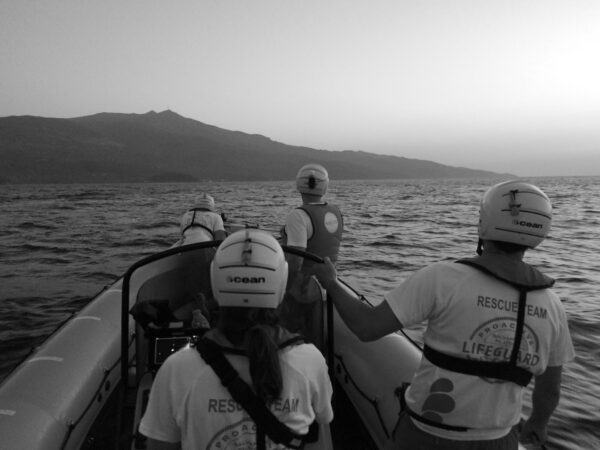
Despite the intense nature of the work, Caoimhe’s capacity to stay engaged over the years has remained anchored in a personal sense of political commitment, alongside deep care and respect for the people whose lives she accompanies. These relationships have opened up her understanding to the different dimensions of what attuned solidarity work means.
Nadia is a Yazidi survivor of the Islamic State’s genocidal attacks on Sinjar who Caoimhe first met when she was working in a containment camp on Lesbos, in 2015. Twenty-three members of Nadia’s family were killed by ISIS, with three older brothers executed in front of her. Nadia was kidnapped and assaulted over the months before she escaped. The fate of her sister, Leila, a wheelchair user and student who was taken away in the back of a truck, remains unknown, but with her name tattooed across her arm, Nadia remains hopeful one day of a reunion.
Part of the relationship between Caoimhe and Nadia initially hinged upon the technicalities of advocacy work, of trying to catalyse access to legal supports and the vital mental health support that Nadia, and particularly her youngest son, needed. But the psycho-social element of the work shifted to a different level when Caoimhe tried to give Nadia some funds raised for her ongoing support, along with a bracelet taken from her wrist, at the time of Caoihme leaving the camp.
“The state of what can be experienced as a shaming enforced dependency is often the thing that breaks people even more than the trauma of the situations they have fled from,” Caoimhe says, “and I could see the shame Nadia felt about taking the solidarity funds. I saw how dignity eroding the gesture was.”
But when Caoimhe presented her with the bracelet as a gift – “sister to sister” – something else entered the relational dynamic between the two women – a visceral grief for the loss of Leila, Nadia’s actual sister.
“Nadia wept, and we held each other. I tried initially, in that holding, to be present with what I know of trauma, and resourcing, grounding and regulating. And then there was the part that just flowed into the rawness of that grief within her. A lot of the relational solidarity work is that – just being present as a friend, a comrade, a sister – to the loss so many survivors are navigating, as well as witness to their profound bravery and tenacity.”
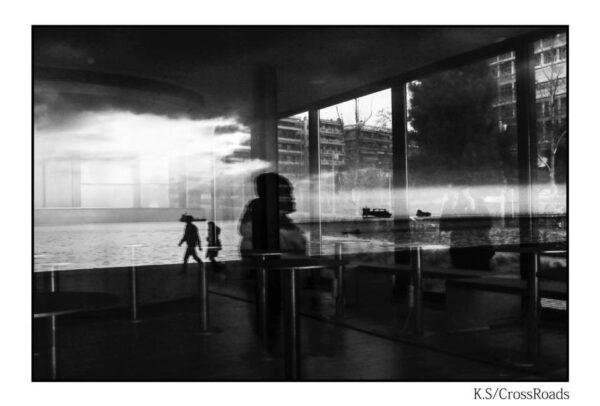
With the complexity and intensity of such encounters, alongside witnessing mass casualty events at sea, the abysmally poor living conditions of the camps, and the ongoing state-enforced violence towards highly vulnerable people, it is perhaps no wonder that many volunteers return home from the camps overwhelmed and burnt out.
Without a common language to process or articulate what they have witnessed, feelings of frustration, despair and grief set in, sometimes exacerbated further by a lack of available community with shared lived experience. Whereas within the camps there is a sense of community which in itself can act as a kind of buffer, on returning home the absence is glaring.
To address this, in 2019 Caoimhe joined an international project team – entitled Working for a Better World – with Comhlamh in Ireland, Action Aid Hellas in Greece, CESIE from Italy, and the Ulex Project. Together over a two-year period they have been developing a set of tools and resources to strengthen the psycho-social resilience of people working within solidarity networks. The project began with a series of focus groups and interviews with people recently returned from the frontlines.
“We spoke with medics from Medicine Sans Frontier and personnel involved with Search and Rescue missions,” says Caoimhe, “people regularly involved in first-hand traumatic witness events – this means resuscitating toddlers, saving and losing people at sea. Solidarity work in these circumstances involves being highly primed often without respite to a continually high state of physiological activation. Because when a ship is going down you have to be ready to go.”
On returning to their homes sometimes weeks after leaving the camps, workers revealed that they had very often remained in these states of activation, grappling with feelings of overwhelm at the injustice they’d experienced. Key to transitioning back into stability were peer-to-peer debriefs, expressed in the focus groups as being significantly more valuable than many of the structural psycho-social or psychological supports often offered by institutions. Along with the debriefs were a need for places of boundaried and safe containment, where feelings could be processed, integrated, metabolised and examined.
In light of these findings and further research, the Working for a Better World project team has been designing peer-to-peer resources and support structures, along with a training manual for grassroots organisers with experience of working directly with refugees, and refugee-led organisations. It is within these latter formations that Caoimhe finds most hope for the future.
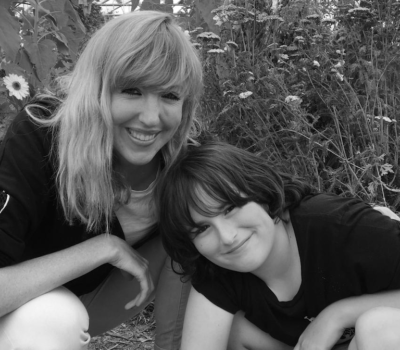
Caoimhe and her son Tadha
“The most powerful movements for migrant justice and beyond borders are those that are refugee, undocumented and asylum-seeker-led freedom movements,” she says, “and I look to these young leaders, these first, second and third generations of young organisers, as a reference point for what accountable, intersectional, emancipatory, decolonised, anti-racism and solidarity work looks like. They bring the inter-generational wisdom and trauma of the journey, but also the creativity of reframing it, subverting it, problematising it, re-storying it – with courage and care.”
“By refusing to be defined by dichotomies of either vulnerability or resilience, they acknowledge these and multiple levels to their lived experience. They ask what does it mean to be conscious in a world of injustice, and how to hold pain in the face of suffering? In showing the way to lean into the grief they are finding the resourcing and power within it.”
More stories and films by Caoimhe Butterly:
Safe Passage : Proactive – Vimeo
The Border (Idomeni) – Vimeo
Freedom – Vimeo
Breathe: This One Precious Life: article, published by Hot Press, 8 May 2020
READ ON: Somatic Spaces for Healing Activist Trauma »»»
For the fourth year running the Ulex Project collaborated with Advaya and Gita Parihar to offer the Regenerative Activism conference, this time focussed on the theme of Building and Sustaining Our Movements.
Over a five week period, from 24 February to 21 March 2021, hundreds of people tuned in around the world to participate in a range of critical conversations and a half day workshop exploring the transformative power of social movements.
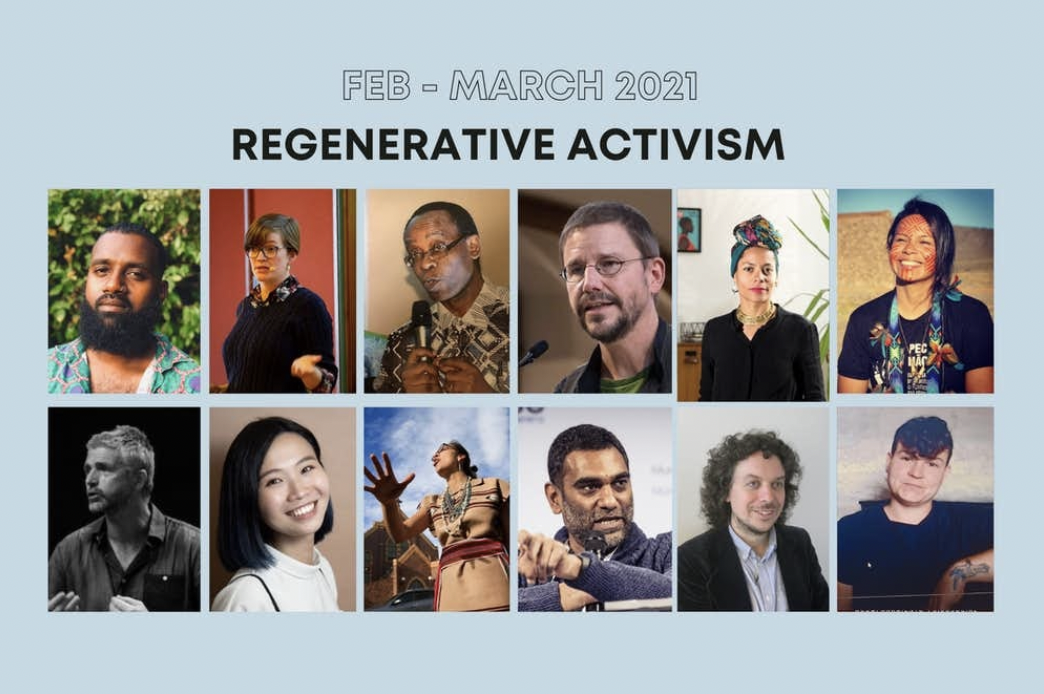
Thanks to everyone who attended, and we look forward to seeing you again next year! Here is a summary of each of the sessions with links to recordings and speaker’s info:
WEEK ONE: FACING REPRESSION & BUILDING MOVEMENT RESILIENCE
Hosted by G from Ulex Project with Ilaj (LGBTQI+ psycho-social resilience trainer at Ulex), Glacier Kwong (Hong Kong pro-democracy activist in exile) and Laurence Cox (author of Why Social Movements Matter and Director of the MA in Social Activism at the University of Maynooth Ireland).
Dialogue 1: This session dwelt on the experiences of people working across diverse contemporary movements, as well as looking at some of the lessons we can learn from history. We heard about the challenges faced by pro-democracy organisers in Hong Kong over recent years, and explored the experience of LGBTQI+ movements across Central and Eastern Europe facing harsh repression. We learnt about how different systems construct consent for repressive violence or find ways to conceal movement suppression within the mechanisms of social reproduction and what this means for our organising.
To find out more about the speakers, their work and trainings, please visit the sites here:
The aims of the training are to:
• Ilaj: LGBTQI+ Resilience, Ulex Project
• Glacier Kwong: Hong Kong Democracy Council
• Laurence Cox: Personal website: Learning From Each Other’s Struggles
• G: Ulex Project – Courses & Events
WEEK TWO: ROUTES OF RESISTANCE : NARRATIVE, CULTURE & POWER
Hosted by Christabel from Advaya with Emilia Roig (founder of the Center for Intersectional Justice), Lyla June Johnston (poet, singer-songwriter and community organizer of Diné (Navajo), Tsétsêhéstâhese (Cheyenne) and European lineages) & Joshua Virasami (organiser, artist and author of How To Change It: Make A Difference).
Dialogue 2: This session explored how movement building involves the development of narratives and the construction of empowering identities, and asked how identities which grow out of our past can continue to evolve as we generate and envision new social relations. As Stuart Hall has said, instead of thinking about “people‘s roots, we ought to think about what are their routes, the different points by which they have come to be now; they are, in a sense, the sum of those differences.” These issues were discussed in relation to the politics of British Black identity, relationship to heritage and tradition in indigenous organising, and current challenges within decolonial and antiracist movement building today.
To find out more about the speakers, their work and trainings, please visit the sites here:
• Joshua Virasami: Book: How To Change It: Make A Difference
• Emilia Roig: Events, media & more: Centre for Intersectional Justice
• Lyla June Johnston: Music, writing, podcasts, events: Personal Website
• Christabel Rose: Advaya
WEEK THREE: GLOBAL MOVEMENTS: POWER, RESOURCES & RESILIENCE
Hosted by Gita Parihar with Kumi Naidoo (Human Rights and Environmental Justice Campaigner, Founding Chair of the Campaign for a Just Energy Future), Nnimmo Bassey (artist, activist and author of To Cook A Continent: Destructive Extraction and Climate Change in Africa), and Silje Lundberg (community organiser, President of Friends of the Earth Norway).
Dialogue 3: This session explored the multi-layered response of global environmental movements to the complex series of threats that affect all who inhabit this planet. We discussed questions of power, money and resource in movement-building, looking at differences between the global north and south, as well as professional and volunteer activist spaces. We considered sources of and responses to burnout and the distinct contribution of youth activism.
To find out more about the speakers, their work and trainings, please visit the sites here:
• Kumi Naidoo: https://twitter.com/kuminaidoo
• Nnimmo Bassey: https://twitter.com/NnimmoB
• Silje Lundberg: https://twitter.com/siljelundberg
WEEK FOUR: PSYCHOSOCIAL PRACTICES FOR SUSTAINING OUR MOVEMENTS
Hosted by G from Ulex Project with Daiara Tukano (indigenous activist and artist of Tukano indigenous nation of the Upper Rio Negro), Stefania Grasso (Advocacy Officer at Aluna Acompañamiento Psicosocial, Mexico) and Peter Steudtner (human rights activist, documentary film-maker and trainer for nonviolent conflict transformation.)
Dialogue 4: In this session we talked with practitioners who have developed holistic frameworks that recognise the interplay between the individual, group and socio-political levels of activist practice. In Mexico, Aluna uses a model of psychosocial accompaniment based on ‘liberation psychology’ to support victims of political violence. Peter Steudtner was one of the authors of the Holistic Security Manual, that offers integrated methods of analysis and strategy to deal with psychosocial, physical and digital threats. Daiara Tukano brings her experience of facing these challenges as an artist and researcher in human rights focused on independent communication within the indigenous movement.
To find out more about the speakers, their work and trainings, please visit the sites here:
• Peter Steudtner: Holistic Security
• Stefania Grasso: Aluna website in English / The Book: Modelo de Acompañamiento Psicosocial ALUNA
• Daiara Tukano: Personal Website
Thanks to everyone who helped create the 2021 series, and we look forward to seeing you again next year! To stay posted on the 2022 event sign up for our newsletter.
READ ON: 8 Resilience Trainers Offer Their Top Tips »»»
For over a decade, Ulex trainers have been working on psycho-social resilience training for activists. In recent years we have been developing a curriculum aimed specifically at the LGBTQI+ community, alongside supporting social movements in Eastern & Central Europe.
To address the specific challenges of the LGBTQI+ community in this region, the Ulex Project is now launching a 4-month long LGBTQI+ Resilience Online Programme.
So why now? The global pandemic has made it impossible to host in-person international meetings and gatherings. At the same time the pandemic is hitting the LGBTQI+ community particularly hard with reduced access to healthcare alongside increased levels of domestic violence, state repression and economic precarity. Read more about how the COVID-19 pandemic is impacting the community in this report by Transgender Europe (TGEU) or this report by the International Lesbian, Gay, Bisexual, Trans and Intersex Association (ILGA) Europe.
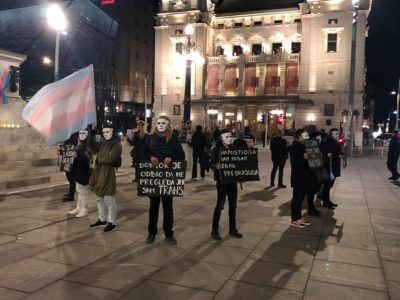
Protestors in Belgrade, November 2019
Even before the pandemic struck there was already enormous pressure on LGBTQI+ movements in Eastern Europe and post-soviet countries, with people finding themselves working in increasingly hostile and prejudiced environments. Activists across the region are working daily with high levels of stress, media attacks, and repression driven by state and non-state actors.
Being able to navigate the challenges and uncertainties of everyday life alongside working for a social change is challenging, demanding and draining. Especially now.
»»» Read more about the Ulex Project LGBTQI + Resilience Project
As a response to the COVID-19 crisis the internet has become even more overloaded with information on how to take care of ourselves. A wide range of tools for wellness and resilience building, apps monitoring mood and sleep quality, online workshops for mindfulness and more are available in abundance! The world moved online and the amount of people promising ‘fixes’ can feel overwhelming. The Ulex team decided that we want to create a space that feels different and offers something that will support LGBTQI+ activists in Central and Eastern Europe in a more sustained and in-depth way. Hence, at the beginning of April 2021 we are launching a 4 month-long online training on LGBTQI+ Psycho-Social Resilience for activists from Central-Eastern Europe and other post soviet countries.
This will be an opportunity to build community together and explore topics such as burnout, trauma, repression, emotional literacy and psycho-social resilience in a focused, closed group, preparing participants to go back to their groups and communities to apply the tools learned and keep the movements in the regions nourished and resilient.
The aims of the training are to:
• Equip participants with basic knowledge and tools around personal, group and movement resilience
• Offer a nourishing and supportive space to explore one’s own resilience
• Build meaningful relationships among participants
• Enable participants to implement changes in the groups and networks they are working with
The topics we will focus on are:
• Relationship building and sustaining
• Burnout basics, prevention and how to work with it
• Repression and suppression analysis, prevention, risk assessments
• Trauma basics and community based healing tools, first responses
• Emotional literacy
• Navigating power in our groups and in our movements
• Conflict transformation and communication cultures
• Ecology of Social Movements
Who will be participating?
Ulex will be working with a range of partner organisations, grassroots organising collectives and movements involved in LGBTQI+ activism, supporting people who identify as LGBTQI+, and are coming from and working in Eastern Europe, Western Balkans and other post-soviet countries. We are specifically working with those in positions who are able to pass on the knowledge gained at the course to benefit their communities. We are really excited to be working with committed people who will be both engaging with learning and tasks outside of the online sessions, as well as taking part in the online group sessions.
Want to learn more about the training?
For more information be in touch with Ilaj: eweryst@ulexproject.org
READ ON: Resilience as Resistance: LGBTQI+ Movement Building in the Balkans »»»
Coming up from April 9 – 11, 350.0rg and hundreds of organisations round the world will host a global three-day online event for the climate movement to ‘recharge, rebuild, and reconnect’. The Ulex Project will be offering an Activist Psychosocial Resilience workshop on Friday April 9.
Choices are being made right now that will shape our society for decades to come; the gathering will explore what we need for a just recovery from the climate and COVID-19 crises. A three-day online event with 350.org and hundreds of organisations around the world, the Global Just Recovery Programme is an online opportunity for people around the world to come together to collectively reimagine our future.
Featuring interactive workshops, cultural sessions, and hands-on trainings, this will be an opportunity to build skills, strengthen relationships, and hear from a powerful line-up of climate leaders, artists, and musicians in every corner of the world. The program events are free, online, multilingual and will be running six hour cycles over three different time zones to make it a truly global event. Learn more and register here.
The plenary panels include:
• Just Recovery for All – with Hakima Abba, Naomi Klein, and Yvonne Aki-Sawyerr
• Hearing the Guardians of the Earth – with Eriel Deranger, Noelene Nabulivou, and Francisco Javier Vera Manzanares
• The Urgency of Intersectional Organizing: BIPOC Voices on Climate – with Chibeze Ezekiel, Pennie Opal Plant, Patricia Wattimena, and Ayakha Melithafa
• End Fossil Finance – with Bill McKibben, Mitzi Jonelle Tan, Sharan Burrow, and Demond Drummer
• Building Power Through Youth Organizing – with Greta Thunberg, Brianna Fruean, and Vanessa Nakate
In addition to the panels and cultural sessions, there will be over 180 workshops and training events to support individuals and campaign groups in designing a new path towards a better future for all. The full list of workshops on offer is listed on the website.
Ulex Project Workshop: Friday 9 April, 17.15-18.45 CET
Climate Justice organising faces high rates of burnout. The scale of the challenge, the emotional impact of the climate reality, and the power of opposition can be overwhelming, depleting, and demotivating.
This workshop will draw on over a decade of training work on activist sustainability and resilience to support participants and their organisations to develop an increased understanding of the issues related to building activist resilience at the personal and group levels. Using a holistic approach that recognises the intersection of personal, group and socio-political dynamics, it will support participants to reflect on the conditions that deplete and undermine their work and motivation – and to explore strategic interventions.
This will be a 90-minute interactive session, using small group activities and reflective exercises.
Who is it for?
The training is for people involved in climate activism, both newer and more experienced activists.
How to apply?
Info and registration here.
After you register you will get an email with your personal credentials to join and a link to the event portal.
Once there, you will be able to navigate the site—browse and sign up for sessions—using a platform called Pheedloop. A video on the home page provides instructions on how to do that.
See you there!
READ ON: 8 resilience trainers give their 2 top tips for staying sane in fierce times »»»
We’re excited to be co-hosting, for the fourth year running, the Regenerative Activism 2021 Conference: Building & Sustaining Our Movements, a series of 4 critical conversations and a half day workshop exploring the transformative power of social movements. We’d love you to join us!
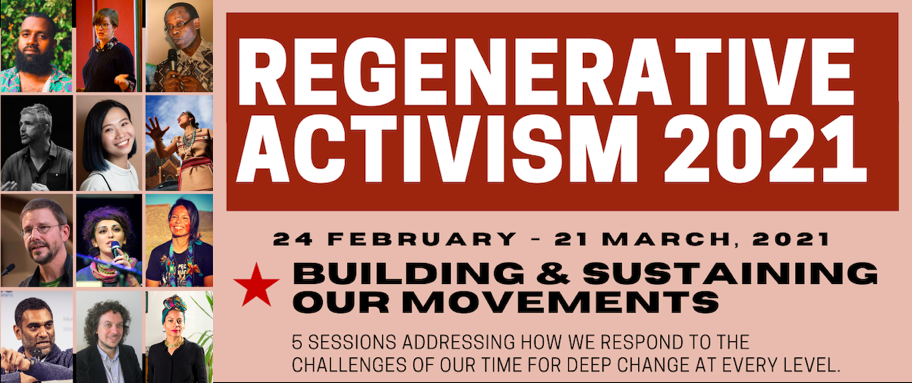
Over the space of five weeks, in collaboration with Gita Parihar and Advaya, we’ll bring together activists, organisers, thinkers and doers from across the world engaged in diverse social movement practice. We’ll reflect deeply together, share lived experience, and explore how we can increase our collective capacity to build and sustain our movements at this crucial time.
LEARN MORE AND BOOK YOUR PLACE NOW
We know that to build and sustain powerful and effective movements, we need spaces to learn from each other’s struggles. Regenerative Activism 2021: Building & Sustaining Our Movements consists of 4x 2-hour sessions taking place each Wednesday from 24 February to 21 March 2021, followed by a 4-hour Sunday workshop.
Session themes and speakers include:
1st Session – Facing Repression: Building Movement Resilience with Glacier Kwong, Dilar Dirik and Laurence Cox. On Wednesday 24th February.
In this session we’ll draw on the experiences of people working across diverse contemporary movements, including the Kurdish movements from Rojava and pro-democracy organising in Hong Kong. We’ll hear how different systems construct consent for repressive violence or find ways to conceal movement suppression within the mechanisms of social reproduction and what this means for our organising. Learn more…
2nd Session – Routes of Resistance: Narrative, Culture and Power with Emilia Roig, Lyla June Johnston and Joshua Virasami. On Wednesday 3rd March.
In this session we’ll explore movements that draw on specific cultural legacies and are rooted in unique historical struggles, and discuss how we might build new movements of solidarity with those shaped by different routes. We’ll discuss these issues in relation to the politics of British Black identity, relationship to heritage and tradition in indigenous organising, and current challenges within decolonial and antiracist movement building today. Learn more…
3rd Session – Global Movements: Power, Resource and Resilience with Kumi Naidoo, Nnimmo Bassey and Silje Lundberg. On Wednesday 10th March.
This session explores the multi-layered response of global environmental movements to the complex series of threats that affect all who inhabit this planet. We will discuss questions of power, money and resource in movement-building, looking at differences between the global north and south, as well as professional and volunteer activist spaces. We will consider sources of and responses to burnout and explore the distinct contribution of youth activism. Learn more…
4th Session – Psychosocial Practices for Sustaining Our Movements with Aluna, Daiara Tukano and Peter Steudtner. On Wednesday 17th March.
In this session we’ll talk with practitioners who have developed holistic frameworks that recognise the interplay between the individual, group and socio-political levels of activist practice. Drawing on wisdom gained from struggles within indigenous women’s movements in Brazil alongside models of psychosocial accompaniment based on ‘liberation psychology’ in Mexico, we’ll explore integrated methods of analysis and strategy to deal with psychosocial, physical and digital threats. Learn more…
5th Session – Regenerative Activism: Building & Sustaining Our Movements. Workshop by Ulex Project. On Sunday 21st March.
A highly participatory and interactive closing session, this half day workshop will draw on the themes of the previous four dialogues, where together we’ll draw out key areas of learning and ask what this means for our practices of sustaining and building powerful social movements today. Learn more…
CLICK HERE TO BOOK YOUR PLACE NOW
In order to make the event as accessible as possible this conference has a tiered pricing structure so please pay what feels right to you, and get in touch if finances get in the way of your attendance. We recommend attending the whole series if you can, but it is possible to buy tickets for individual sessions if preferred.
We look forward to learning alongside you very soon!
READ ON: 8 resilience trainers give their 2 top tips for staying sane in fierce times »»»
How can we design decision-making frameworks and share power in more nuanced and effective ways in our movements?
In recent years there has been an explosion of interest in agile and decentralised approaches to self-organising structures, drawing on systems thinking, information theory, and notions of agility. In the Organisations Revisioned training at Ulex we explore how some of these approaches have revolutionised practice and can be harnessed within social change organisations to build resilience and impact. In October 2020 two of the Ulex training team – Gee and Ella – joined Merab Ingabire from Solidarity Uganda to offer a group of organisers from around the world an online workshop exploring the theme of Beyond Hierarchy and Horozontalism.
In the article below originally published by Global Platforms, Phil Wilmot, co-founder of Solidarity Uganda, shares some of his take-home points from the workshop aimed at supporting movements to share power in more nuanced ways.
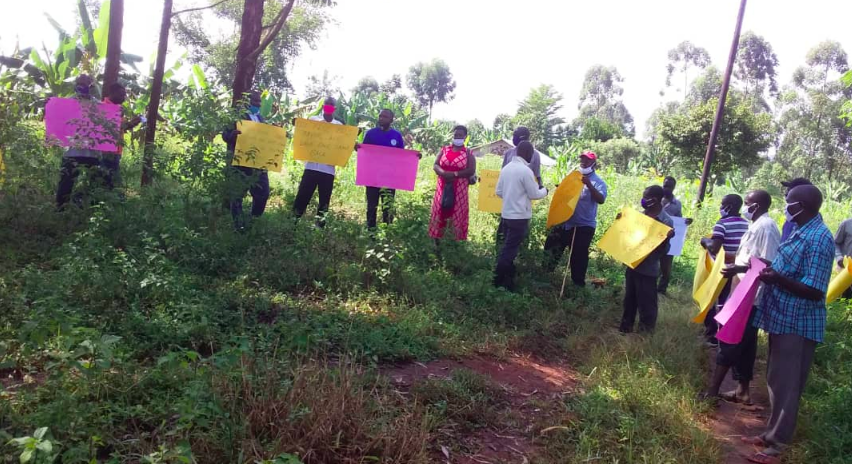
Solidarity Uganda blends elements of horizontalism and traditional civil society organizational structure to support its member-based resistance network.
The Hows of Horozontalism
Organisations play a central role in supporting individuals and groups to come together to learn, act and have an influence towards social, economic and environmental justice. When they work well they multiply our influence, they channel energy, and they promote creative and innovative action. Yet organisations face numerous challenges from sustaining themselves financially, to dedicating time to reflection and learning, and to managing diverse points of view and skills.
Many grassroots organisations reject hierarchies in favour of flat structures and systems, but can suffer a loss of responsiveness, continuity and scope for innovation. New approaches to organisations can help solve those problems. Others theorise about swarming and the power of non-linear dynamics, but often fail to apply them beyond critical moments of spontaneity.
The right balance of structure can enable agility and spontaneity, whilst supporting longer term purpose. More traditionally hierarchical organisations often seek to benefit from adopting new self-management methods (like those explored in Frederick Laloux’s Reinventing Organisations), but too often applying these approaches merely mask the old hierarchies. The Beyond Hierarchy and Horizontalism workshop explored these challenges, gave an overview of the field, and aimed to build confidence and understanding to support organisations to evolve into agile, resilient, effective networks able to embody their values.
Many organisations rely upon and thrive from successful collaborations or partnerships, and social networks and social media are supporting even greater connectivity between organisations. These connections form an important part of strategies for resilience when societal, economic and environmental challenges are deepening.
I have had the privilege of training all kinds of alliances: labour unions, student groups, NGO coalitions, informal community groups. I’ve witnessed so many powerful organisers traveling the path to victory, only to be derailed by their own leadership. In these (annoyingly common) instances, members shift their focus from the target of their external enemies – a government or company, for instance – to their own group’s leaders. In such moments, movements usually hit the pause button on their goals until they can straighten out their internal mess, thus sacrificing the momentum they had built for their cause.
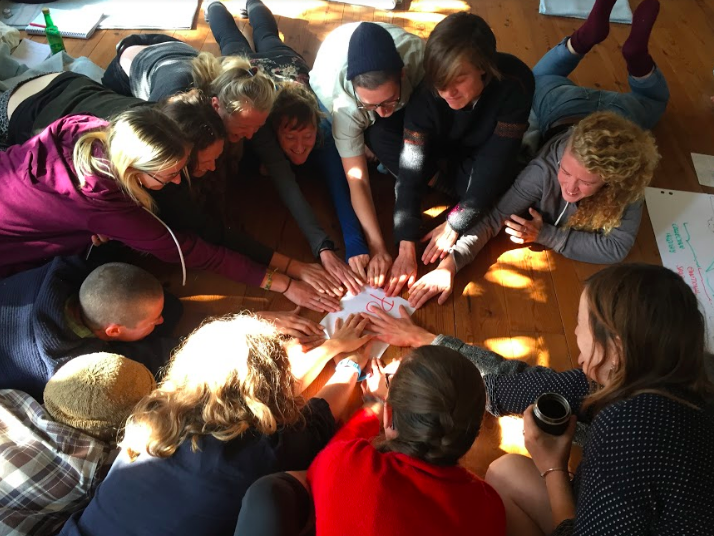
Every group and structure uses some combination of personal agency and collaborative teamwork to make decisions.
I have also been a member of activist groups where the aversion to hierarchical leadership is so strong that a simplistic sense of “we make decisions together” sets in, without the structure for that joint decision-making to actually flourish. Without the deliberate creation of values, group culture, and process, the members of the group with more power (say, based on gender, age or experience) invariably seize control. Sometimes this capture of power within a group is deliberate, and sometimes it is accidental. But in all cases, it stifles the emergence of collective power.
In the words of Gee from Ulex, as described in our 2020 report on Sustaining Social Movements: “It always seems to be the case that there are small groups of people pulling the strings, themselves in denial that this is going on.” This culture of denial of hierarchical elements and disparities of the privilege at play within the group gives way to a kind of fetishization of horizontalism. A group’s more powerful members exploit the lack of structure in the very name of inclusivity to concentrate more power around themselves.
So how do we make decisions together, despite these internal challenges in our movements?
In answering this question we start with acknowledging that there are more than two types of structures. We do not have ONLY hierarchical and horizontal models. Every model falls somewhere in between these polls. A vertically-organised corporation, for example, may have an employee or client complaint desk to solicit feedback from stakeholders in the company. Every group and structure uses some combination of personal agency and collaborative teamwork.
Asking whether we want to form hierarchical or horizontal groups is a question likely to derail us into the tyranny of structurelessness. I have often been wrapped up in unhelpfully polarized conversations about whether the “NGO model” or “movement model” is the right structure to adopt to make change. Neither “model” tangibly exists. Each has countless sub-types. There are NGOs that are more member-led than some movements, and movements that are more authoritarian than NGOs operating under the leadership of an executive director or CEO.
The devil is in the details. We can begin to work through the nuances of our groups by asking what kinds of decisions we must make, and how we will make those kinds of decisions.
Ella from Ulex guided organisers through seven (non-exhaustive) styles of making decisions. In any movement or group, tasks may be decided in a number of ways, as illustrated:
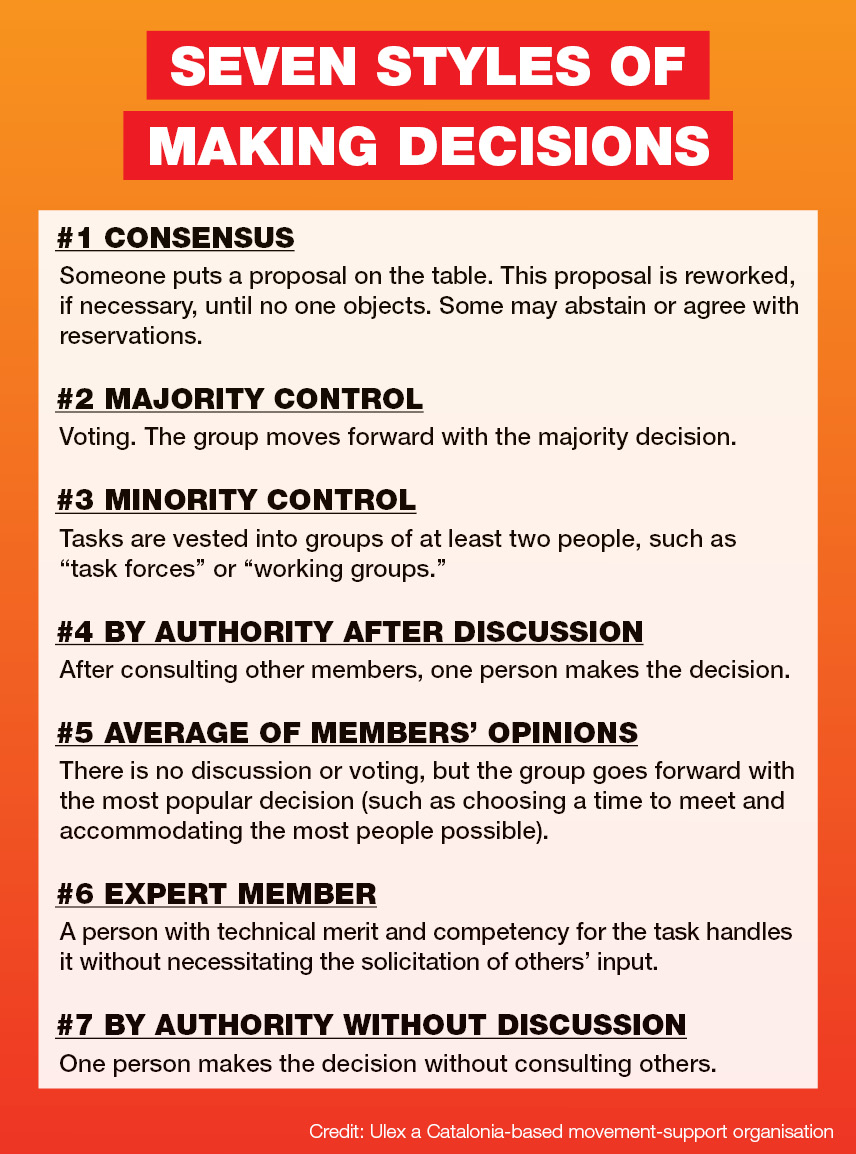
Ulex Project: Seven styles of making decisions
Movements, organisations, banks, armies, sports teams, supermarkets: groups across diverse contexts use all or most of these approaches, often simultaneously -and not always consciously. Movements have the burden of creating MORE structure – not less – to deliberately empower decision making in ways that are strategic, expeditious, inclusive, and scalable, based on their objectives and circumstances.
To use an extreme illustration, if your movement is organising a protest where police brutality is anticipated, it is unlikely that protesters will stop in the middle of their action to build consensus on whether and how to treat an injured member. Rather, that power might be vested in an expert with a medical degree or a working group that has gone through first responder training.
An executive director of an NGO might find it wise not to accept a grant by her own authority without discussion, but rather consult staff before making the decision, or perhaps solicit their green light and programmatic amendments through a consensus process.
To achieve their goals, groups must develop nuanced decision-making systems and cultures. There is no one-size-fits-all horizontalism. Sharing power through processes deliberately built for the group’s objectives and context will increase the group’s chances of success.
This article was originally published by Global Platforms on November 13, 2020. Written by Phil Wilmot. Link to original article here.
Further reading:
Solidarity Uganda website
Global Platforms Sustaining Social Movements report, March 2020: Phil Wilmot
The Tyranny of Structurelessness : Jo Freeman aka Joreen
Reinventing Organisations website : Frederick Laloux
Organisations Revisioned: Ulex Training 2021
READ ON: The Power of Activist Education»»»
In Sweden, four activists who attended a training at Ulex launched a Resilient Movements project on their return. They speak about the negative impact of productivity standards on activist culture, and how social movements can become more resilient through daring to break silence around burnout.
By Valdemar Möller
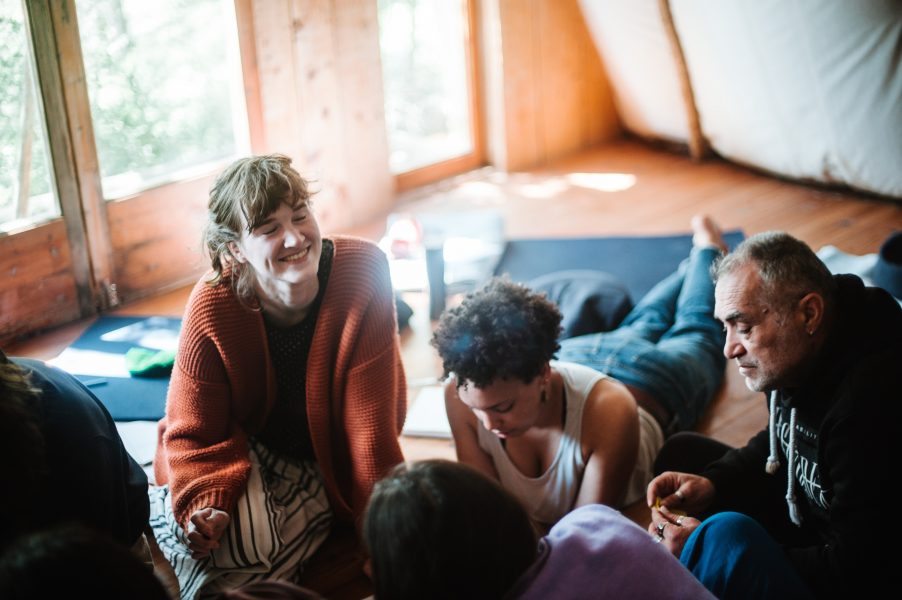
Olivia Linander participated in a course at Ulex in 2016 before bringing tools of regenerative activism to launch the organisation Resilient Movements in Sweden. Photo: Helen Angelova.
Two days before this interview, Lanja Rashid and Olivia Linander – who run Resilient Movements (Resilienta Rörelser) together with Sam Lindskog and Johanna Lundström – held a 4 hour workshop on Sustainable Activism as part of a Radical Book Fair event in Sweden. Speaking about the event, Olivia says she was grateful to have had a substantial amount of time to address a subject that gets relatively little air time across social movements, despite stress and fatigue being commonplace in many organising circles.
Still, four hours is relatively short in comparison with the ten days of immersive training that the Resilient Movements team completed with Ulex in 2016, the starting point for the birth of Resilient Movements. Prior to this, Olivia herself had been suffering with burnout from her involvement with the climate movement during a particularly intense period in 2015.
“Following on from 2015 I was on sick leave for three months,” she says, “and then went straight onto my first course at Ulex in the autumn of 2016. I received a lot of helpful support and resourcing when I was there, and felt much stronger on my return”.
An easy slide into negative patterns
The course that Olivia participated in was part of a programme of trainings Ulex hold to support social movements to become more impactful and influential, whilst also increasing movement capacity and resilience.
“Before I left the training,” Olivia explains, “I asked the Ulex team how many Swedes had been there before and they told me I was the first one. I said that they could get in touch if they wanted to reach more people in Sweden and a year later we started a partnership training project together with an intersectional movement for women and non-binary people in Sweden called Streetgäris”.
Following on from meeting at Ulex, Lanja, Sam, Olivia and Johanna decided to start Resilient Movements. Lanja had also been on the road to exhaustion through her activism, but through the tools and practices she learned at Ulex she felt resourced and better equipped to continue. “The course helped me a lot,” she explains, “I learned new ways of thinking about and approaching activism.”
However it’s been a few years now since Lanja participated in the trainings and she stresses that it is easy to forget some of the key learnings and get carried away again with the all consuming nature of activism. “There are key questions that arose on the training that are necessary to constantly be reminded of,” she says “as after a year or so you might find yourself stuck back again in the same negative patterns. Continuing to talk about these issues through our work with Resilient Movements helps remind me of where I’m going and where I want to be.”
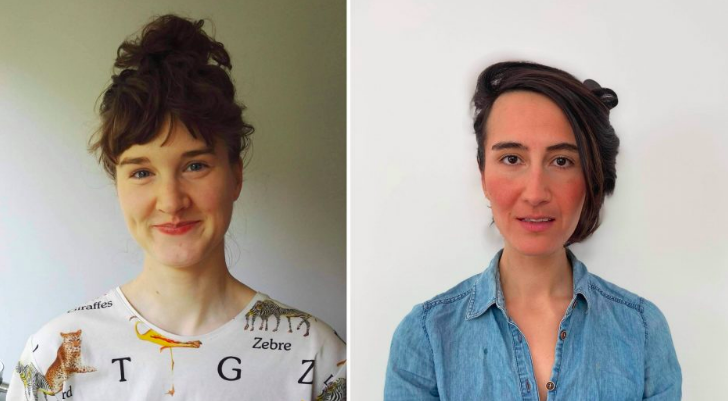
Olivia Linander (left) and Lanja Rashid (right) run the project Resilient Movements together with Sam Lindskog and Johanna Lundström. Photo: Private.
Making the personal experience collective
According to Lanja and Olivia the first step in making activism more sustainable is to actually carve out the space to start talking about it.
“We see that there are many people with personal experiences and problems to share,” says Lanja, “and that these often extend beyond the personal and occur as patterns within and across our organising circles and movements. So we try to take these personal experiences and turn them into collective experiences. Because if we are to succeed with finding solutions to these problems, we must do so in our groups.”
We need to talk about burnout
Within many organisations there is often a culture of not wanting to talk about issues such as stress and burnout, an issue that Olivia feels sits central to the health of our movements.
“It is a problem in so many organisations,” she says “but even if the subject gets raised, then often it stops at the talking level whereby people say “this is what we should think about” instead of discussing action that they can actually put into practice. It lands easily on an individual level, but it is not always possible for everyone to handle it by themselves. Or it ends up with a Board that decides how to take care of it. But we believe in order to really meaningfully address burnout that everyone in the organisation needs to be involved.”
Challenging the productivity norms that govern our thinking
Speaking about productivity norms that are active in society, Olivia continues to talk about how these same norms are reflected in activist and social change movements.
“That can be easily overlooked,” Olivia says, “especially when one is in a context that is system-critical, which means it can be difficult to talk about how these structures also exist within ourselves. It is a long-term job to become aware of them and then train them away.”
Lanja continues: “We are all children of a productivity society where we’re taught that things should go fast and you should do as much as you can, that you should be perfect and make everyone happy. It affects us both as individuals and as groups. In addition we now have a stress norm, which according to recent study shows that young people now gain a kind of status in being stressed because it shows that you have a lot to do and if you have a lot to do, you are an important person! These are standard norms and behaviours within the walls of many social change networks and organisations.”
How this shows up in behaviours within social change settings, Lanja and Olivia explain, is that people feel that they need to apologise when they say no to a task, or need to justify taking a break from activism. “This in itself is a sign,’ Olivia explains, “that we have norms and expectations in place where we’re not being so kind to one another.”
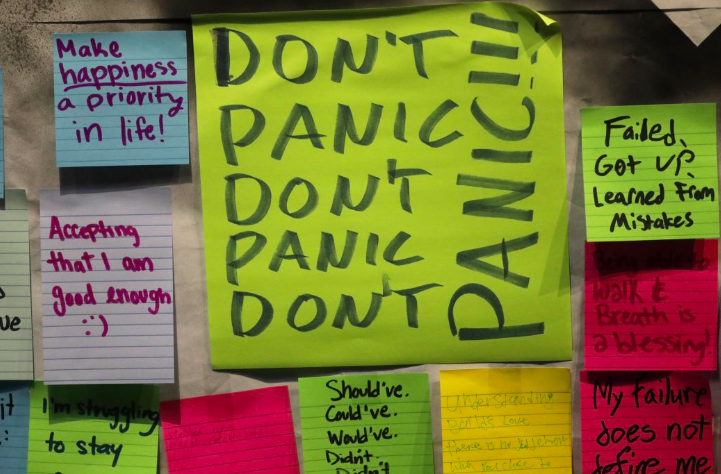
As an activist, Lanja and Olivia say, it is easy to succumb to the demands that are shaped by productivity norms in society. Photo: Rick Browner / AP.
How constructs of time fuel unhealthy productivity
Olivia believes that many of the issues inherent within productivity are also related to how we view the concept of time, another subject which was unpacked and explored during the Ulex training. “The usual way of perceiving time is as a linear concept where everything develops through moving forwards. Either we are moving towards some total victory or we are heading towards the end of the world.”
Olivia advocates that instead of this standard narrative there could be more supportive ways of resourcing social change work by opening up to a more circular way of thinking about time, where we accept that struggle in various forms has always existed and will always exist, and that even if we win some victories, new challenges will always arise.
In addition to stress and demands for success, the trainers at Resilient Movements have also witnessed that political struggle is often characterized by a sense of duty and guilt instead of desire and hope, which further increases the risk of burnout and people having to drop out of activism. Olivia says that this is not only a great loss for individuals but also for social movements in general. “When people break down this makes us weaker as movements. We lose in number, but also in diversity, experience and power.”
“If we change our way of thinking about time, struggle and gains,” she explains, “we can become so much kinder to both ourselves, and to our movements.”
This article was originally published on Landets Fria on October 6, 2020. Written by Valdemar Möller. Link to original article here.
More information:
Resilienta Rörelser – Resilient Movements, Sweden
READ ON: Sustaining Resistance : A Story of Regenerative Organising »»»
In the first of a series of profile pieces on Ulex project partners, we’re highlighting the excellent work of the Public Interest Research Centre (PIRC) in Wales. PIRC is an independent charity which works to help movements – for equality, anti-oppression, and environmental justice – to tell better stories for a different world.
PIRC believe our society is built on stories. Stories – of our past, present and future – which provide the scaffolding for our political systems, our social structures, and our own thinking. Effective strategies for social transformation involve the contest for how we think, how we see, and the stories we tell about our world. New stories, new thinking, help new worlds come into being.
PIRC’s aim is to strengthen the capacity of our movements to map, reframe and create narratives that will change society and, particularly, to provide support to lower-income and grassroots groups with limited financial resources, who often find themselves excluded from this kind of framing work. The charity facilitates workshops and provides training, conducts participatory research, and produces resources and materials that make the framing process accessible, easy to understand and enjoyable.
Since 2018 PIRC and the Ulex Project have been working in partnership to design and deliver a series of trainings which focus on Framing, Narrative and Story-Based Strategy, with an emphasis on the role of framing in work on climate justice and tackling the rise of the far right in Europe. The training draws on PIRC’s work on Framing Equality, Framing the Economy, and their recent Framing Climate Justice research project.
Elena Blackmore currently leads the Framing LGBTI Equality project at PIRC. Before that she was involved in a number of their previous publications, including Common Cause for Nature, Valuing Equality, the Common Cause Handbook and Building Bridges (on the framing of human rights in the UK). Elena is most interested in how our cultural stories shape oppression and the ways we interact with each other and the natural world. The article below was written by Elena in June 2020 shortly after the murder of George Floyd and the tide of Black Lives Matter uprisings that were sparked in response.
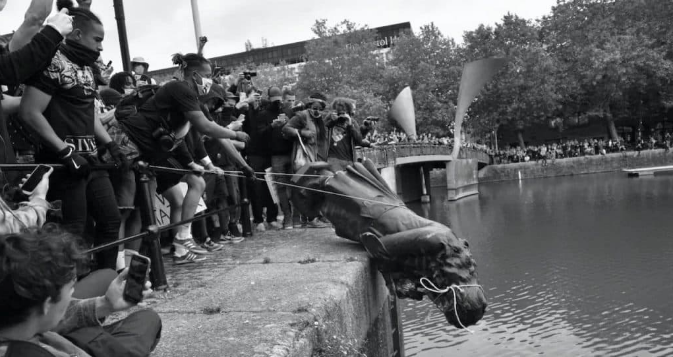
Narrative is more than words
He will never see her grow up, graduate. He will never walk her down the aisle.
Roxie Washington, mother of George Floyd’s daughter
I don’t think many people truly believe the old sticks and stones adage anymore. But working in the world of framing and strategic comms, it’s easy to take it to the other extreme and believe the power of words to be paramount. But words are just one vehicle for the meaning we extract from and use to shape our lives.
What causes my gut to wrench and the grief to wrack my body when I hear of the killings of George Floyd, Breonna Taylor, Ahmaud Arbery, Tony McDade is, only in the simplest of senses, caused by the words I read on a screen. The immediate pain lies in the stories themselves, located beyond the words: the brutal events, the violent interplay between the characters, the horror of the ending. The lives taken: the whole, messy, beautiful humans who will never again walk through their front door or laugh or hug their loved ones again.
And each of their stories is another tile in an incomprehensibly vast mosaic of a narrative that taps into a deep well of familiar pain, a dull ache that I’ve held for as long as I remember.
This is the narrative mosaic of white supremacy and it comprises hundreds of years’ worth of tiles of violent history. We can understand a narrative in this way: as a ‘coherent system of stories’ (Centre for Story-Based Strategy). The white supremacy narrative is a simple but clear one: it posits that there are white people and non-white people; the white people are the default—normal, valued, attractive, worthy—and the non-white ones are the transgression. The narrative tension lies in the ongoing, epic and often lethal struggle of non-white folks to prove themselves to be of worth. (This is the abridged version, of course: there are many competing, complicating and compounding factors that dictate how worthy we deem folk to be. But it holds a deeply-felt truth nonetheless.)
Narrative is fractal
The story I read in the news is of a far away violent event, without justice. But the narrative that I understand is that black people, black bodies are not valued, are not deemed worthy. The truth that I feel is that I am not worthy. Hence the simple but radically disruptive potential of the frame Black Lives Matter, and the searing joy of seeing the folks on the street, the physical expression of belief in worth.
Who taught you to hate the texture of your hair?
Malcolm X
The narrative is ubiquitous. It is in the Hollywood stories with the token character of colour (who is two dimensional, a humorous or tragic prop, the one who dies). It is in the news stories in which white suspects are treated better than black victims. It’s in the kids stories or the long-running British TV favourites with no black characters (the ‘last bastion of Englishness’). It’s in Eurocentric beauty standards in advertising, and the whitewashing of the story of who has borne the burden and the brunt of the pandemic. It’s the number of black people who die in police custody, not just in the States but here in the UK, without a murmur of public concern, let alone convictions. It’s the two months it takes for charges to be brought against violent white men who hunt down and kill a man out running. I don’t need to go on.
But it’s not just out there. It’s not just those racist people. We are all constantly placing tiles in the narrative mosaic, and without conscious effort, we’re likely to be recreating the same old familiar patterns.
Take, for example, the lack of diversity in the sector I work in: the charity sector. The sector most explicitly focused towards equality and justice, but failing to represent those it seeks to serve within its own ranks. Anecdotally, in my experience, the comms and framing sub-‘sector’ I work in suffers the same problem. No, it’s not about black faces in high places. But what story are we ‘storytellers’ telling as a majority white, middle class group, writing the framing strategies for racial or migrant justice? The words are almost irrelevant.
Or take the uncomfortable truths I am facing about myself, week on week, as I work through Layla F Saad’s Me & White Supremacy workbook with a small group of friends. The internalised beliefs I am heartbroken to recognise are inextricably linked to the violence I see.
The narrative of white supremacy is not something out there.
It is made up of infinite individual and collective stories: daily actions, lives lived, our organisations and careers, the media and culture we engage with, what we buy and who from.
How do we change this narrative?
In Emergent Strategy, adrienne maree brown asks us to think fractal: “How we are at the small scale is how we are at the large scale… Grace Lee Boggs articulated it in what might be the most-used quote of my life: ‘Transform yourself to transform the world.’ This doesn’t mean to get lost in the self, but rather to see our own lives and work and relationships as a front line, a first place we can practice justice, liberation, and alignment…”
So just as each violent story is part of the broader narrative of white supremacy, we can live and act the story of liberation ourselves.
I love Brene Brown’s Reckon, Rumble, Revolution model of shifting stories:
1. Reckon
The times are urgent, let us slow down.
Bayo Akomolafe
Brene Brown talks about the first step in changing our stories as the reckoning: getting stuck into how it feels.
Shilpa Shah notes that the narrative, the trauma, is embedded in our nervous systems. As Ayeisha Thomas-Smith says, particularly for folks of colour: “Run, yell, cry, sing, dance, just let this pain be in your body or move through it in whatever way feels right. Give yourself space to let that happen.”
Thanks to Ayeisha for this playlist too. I’d also recommend adrienne maree brown’s selflove twerkout or Beyoncé’s Lemonade.
2. Rumble
If you are paying attention to & sharing the names & stories of what’s happening in the US but not paying attention to what’s happening here you need to pause. This problem isn’t ‘over there’: that is explicitly the system that colonial Britain set up”
Nim Ralph
The next step is to challenge the narrative: looking for the roots of the beliefs you hold and the stories you tell and facing them head on.
I’m eternally grateful for the labour of these amazing women of colour that has gone into resources such as Rachel Cargle’s Great Unlearn, Reni Eddo-Lodge’s Why I’m No Longer Talking to White People About Race (and her podcast About Race) and Ijeoma Oluo’s So You Want to Talk About Race. And particularly for white folks and people with white privilege, I’d highly recommend Layla F Saad’s Me & White Supremacy. Don’t just read it, though: do it. It’s uncomfortable, painful, and needed.
To grapple with the creation of these narratives, listen to Seeing White and The Land that Has Never Been Yet for a powerful US-perspective or We Need to Talk About The British Empire to get stuck into the elephant in the room for us Brits. The current season of Dissect, delving into the meaning of Beyoncé’s Lemonade, is truly healing for me right now: I felt myself crack open as they talked about the disruptive force of accountability.
And follow folks like:
@NMRLPH, @UFFCampaign, @galdemzine, @RunnymedeTrust, @JCWI_UK, @SistersUncut, @OpBlackVote. (11 more anti-racist social media accounts to follow).
If you work in an organisation or organise in a group, the time to take a long hard look at your collective narratives—from your external-facing comms to the inner truths of the structures, dynamics and voices that are heard—was yesterday. At an individual and organisational level, think about where your money is going. Whose work (lives) do you value?
3. Revolution
Now is time to invest in the new narrative.
Show, don’t tell, that you value people of colour. There are plenty of groups who need your support, if you are able. Currently, Black Lives Matter, Official George Floyd Memorial Fund, NAACP Legal Defense Fund need support for the ongoing protests in the US. In the UK, support organisations such as the Racial Justice Network (thanks to Penny for this blog and suggestions for action too).
Seek change within your organisations and the groups you’re in: as How Matters argues, we should: “Call for an end to all white boards and all white leadership… Call attention to whose knowledge, expertise and experience is undervalued… Be an unapologetic advocate for the redistribution of financial resources.”
But think about your words too. For strategies for rethinking our framing and communications, check out this from Topos, this from Color of Change, No White Saviours, this from the Race-Class Narrative Project, and this from Runnymede & Voice4Change England. Challenge episodic framing of racial injustices.
“Be an unapologetic advocate for communications that do not center whiteness in the world. Africans and people in the Global South have been calling for the white savior narrative/industrial complex, and bridge characters to be retired for eons. This matters because this is how stereotypes, generalisations, victimisation, exploitation, and heroism are exposed, challenged, and healed.”—How Matters
Teach kids about race. Like, now. Some book suggestions; some podcasts on how to have the conversations here, here and here.
And when you’re ready, watch this from Emmauelle Andrews & team and read adrienne maree brown’s Pleasure Activism to lay the tiles* of a new narrative in which you are truly worthy and deserving of wholeness, pleasure and joy.
If we’re going to heal, let it be glorious.
Beyoncé / Warsan Shire
* Thanks to Narrative Initiative for the beautiful tile / mosaic metaphor.
This article was originally published by PIRC on June 8, 2020. Written by Elena Blackmore. Link to original article here.
Find out more:
PIRC – Framing Equality
PIRC – Framing the Economy
PIRC – Framing Climate Justice
Framing, Narrative and Story-Based Strategy: Ulex Training 2021
READ ON: 8 Resilience Trainers offer their 2 Top Tips »»»
It’s been a year of uprisings. Some of the boldest have been the women-led social movements in Eastern Europe. Tens of thousands rallied against abortion laws in Poland, while in Belarus women led the way to challenge the falsified presidential election. Ahead of Ulex’s first Self-Defence, Empowerment and Anti-Discrimination Training for women and trans activists, we caught up with two trainers from the region who are supporting others to step up and build their collective power.
By Lindsay Alderton
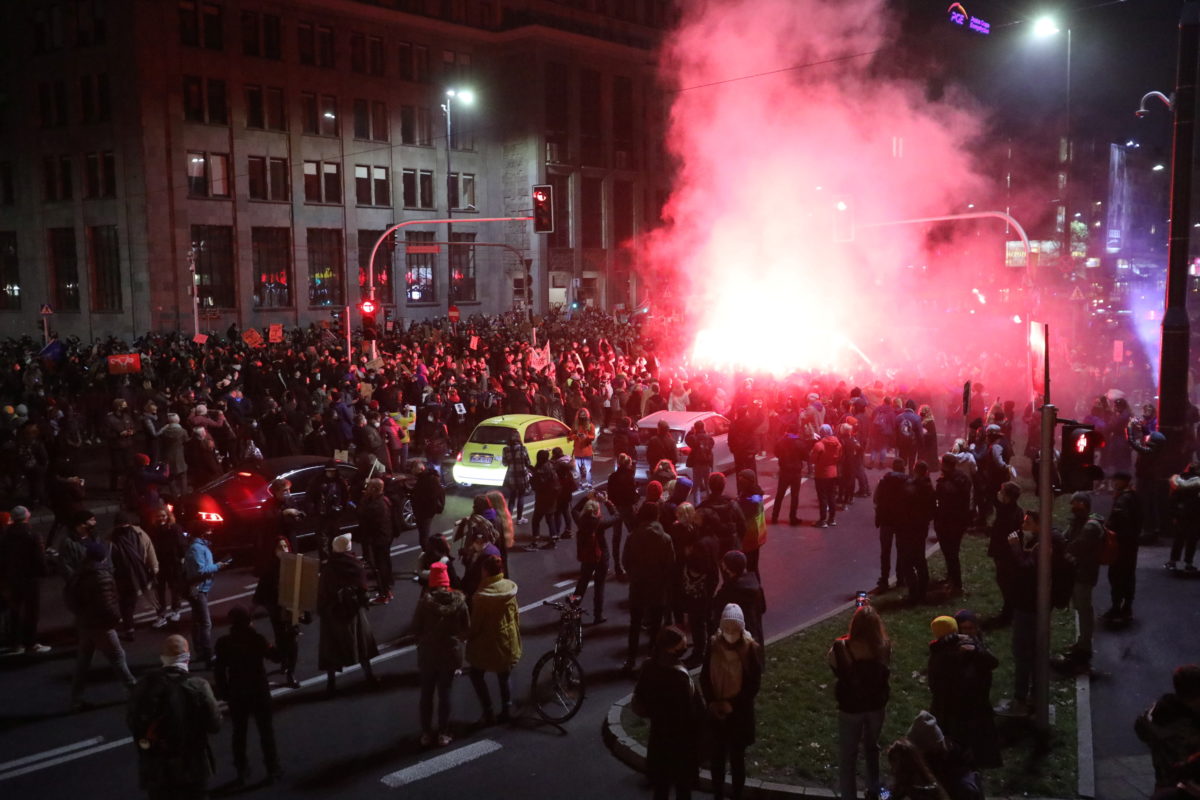
Thousands from the Strajk Kobiet (Women’s Strike) movement have taken to the streets in Poland in 2020.
Credit: Kuba Atys/Agencja Gazeta/via REUTERS
Since the onset of the #metoo movement three years ago, the popularity of women’s self-defence classes has exploded across the world. In Eastern Europe, a network of feminist trainers have been linking the personal empowerment this kind of training brings with a vision of more radical social transformation.
Olga Laniewska spends her free time working with women activists and political prisoners detained for opposing the regime in Belarus, and at weekends she offers Wen-Do self-defence training for women and trans people. Wen-Do originated in Canada, coming out of second wave feminism in the 1970s. It was originally created as a self-defence method to support women with both physical and psychological empowerment. It quickly spread across Western Europe and gained particular popularity in Germany and Poland.
As a certified Wen-Do self-defence trainer, Olga is about to deliver her 100th training. “The Wen-Do workshops are open to anyone who has had the experience of female socialization,” Olga says. “My aim is to bring diverse groups of women together so we can learn from each other and grow stronger beyond barriers and stereotypes.”
Olga first participated in a Wen-Do workshop in 2007 when she was already working as an anti-discrimination trainer and self-defining as feminist. She was excited to learn how tools of self-defence could equip women with practical skills for empowerment, but quickly discovered that the Wen-do methodology was far more comprehensive than a set of physical practices. Her eyes light up when she speaks about the first session and what it revealed.
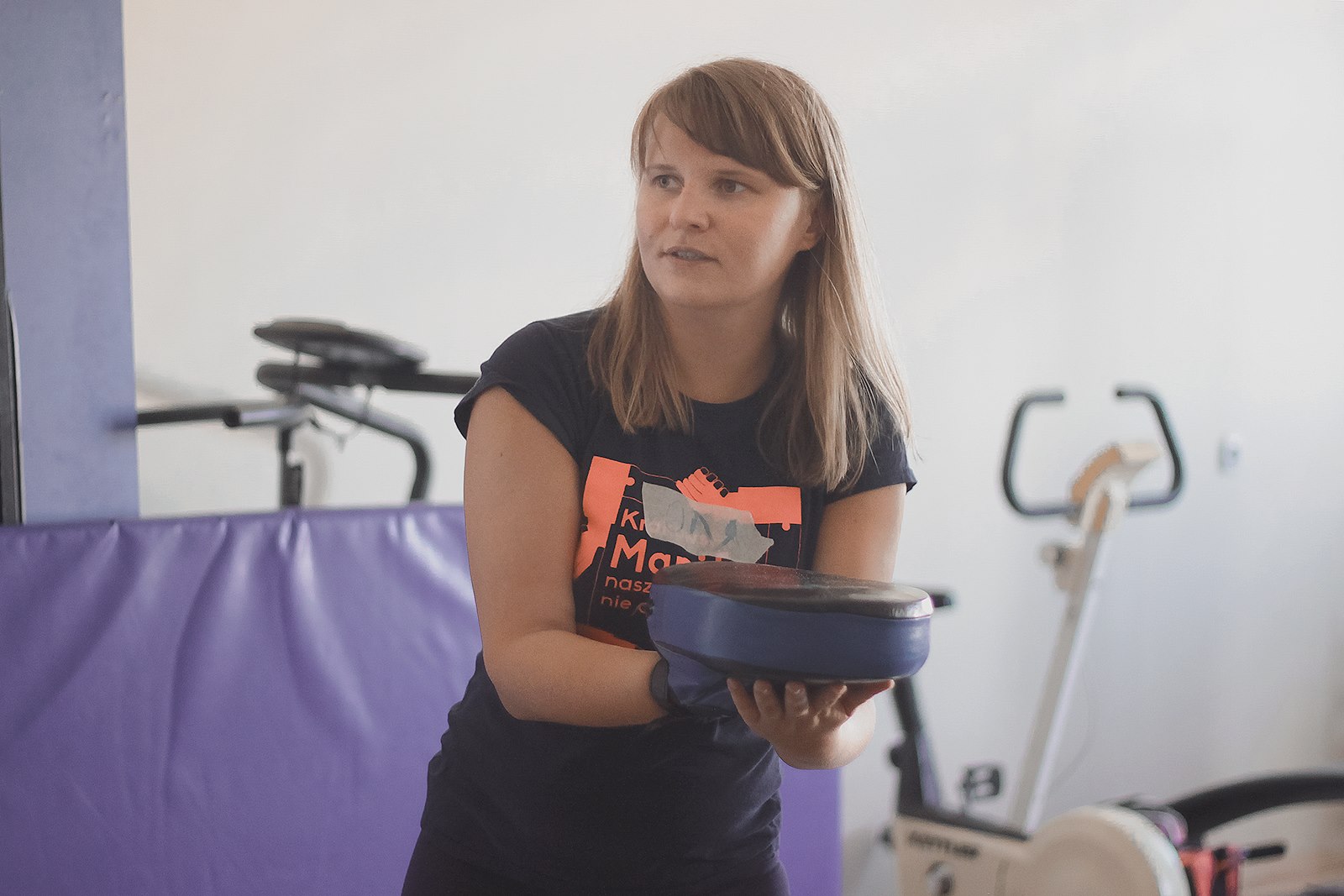
Olga offering a Wen-Do self-defence workshop in Belarus
“Right from the beginning Wen-Do showed me that my own sense of personal power was not something I had to ‘gain back’, because it had never gone away. It helped open up my perspective to reclaim what was already there, to experience empowerment in the body, as something which is felt beyond words,” she explains. “More than that, it taught me to recognise that I can be exactly who I want to be as a woman, rather than the person that the broader culture has taught me I need to be, or should be”.
Olga’s revelations are echoed by another trainer who has been bringing the Wen-Do methodology to women and trans people across the region. Kinga Karp also found herself hooked on Wen-Do from her very first session. “It blew my mind, to be honest,” she says “and brought about a total breakthrough in my ways of being in the world, both in my professional work as a psychologist at the time, and in my role as an activist in feminist and environmentalist circles.”
Wen-Do helped Kinga recognise what was getting in her way, the parts of her socialised self which were actively blocking her from stepping into personal power, from expressing her voice, and from asserting important boundaries. Realising it was an essential tool which could help many others, she immediately started training to become an accredited Wen-Do trainer.
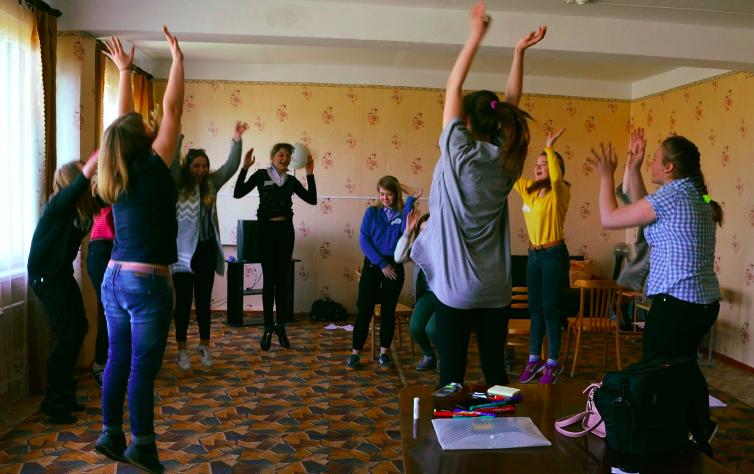
A Wen-Do training includes both psycho-social and physical exercises.
What makes Wen-Do distinct from other methods of self-defence, and what ignited the interest of both Olga and Kinga, is the underlying methodology which addresses three key strands. Firstly, it takes into account the socio-political context which shapes how a particular culture constructs and enforces views around bodies and boundaries; secondly it addresses the psycho-emotional impact of disempowerment and empowerment; and thirdly it equips women with a set of basic physical self-defence techniques, which don’t require extensive or lengthy training in martial arts.
In Kinga’s case she found this ‘whole system’ approach useful in a range of different contexts. It had clear applications in her work as an empowerment coach teaching young girls, as well as more formal settings with NGOs, and even with frontline activist communities directly confronting the State.
When living and working on a protest camp in the Białowieża Forest (Puszcza Białowieska) in 2018, Kinga noticed that many of the local women, whose family members and neighbours worked for the National Forestry company that were logging the primeval forests, were starting to speak up and take action, but needed a space to be opened up so that they could practice and articulate their needs and opinions more confidently amidst the local conflict. Together with a group of activists staying at the camp, Kinga decided to offer some workshops to teach basic self-defence techniques. “It was amazing to see how these local women and girls started referring to themselves for the first time as activists,” she says. “To see them stepping into their own empowerment and their right to defend the land and their right to say no was tremendously powerful.”

Olga observes two trainees at a self-defence workshop in Belarus.
Within the week-long training that Kinga and two other Wen-Do trainers are developing for Ulex, verbal communication skills will be a core component, with a focus around consent and the power and legitimacy of the voice. Both Olga and Kinga have witnessed how many women or people socialised as women often struggle with verbalising and taking up space. This can play into the favour of attackers who know that women often feel embarrassed to react loudly in public spaces, even when their own safety is under threat. “We’ve heard from people who’ve attended these workshops who for the first time in their lives have learned to say no, and to say so really firmly,” says Kinga. “They’ve had the space to look at how they’re fundamentally expressing themselves, and unpack what’s holding them back.”
Beyond a personal sense of empowerment, due to the explicitly inclusive nature of Wed-Do for people with different capacities, one of the deep benefits is how it brings different women together to build collective solidarity and power. As Olga says, “Wen-Do teaches us to work with our bodies the way they are, to be appreciative of the abilities and resources we’ve got, rather than seeking to be something more.”

Wen-Do Self-defence trainer Kinga Karp training a participant in Poland.
She explains how in Eastern Europe, the norms of what a woman should look like are clearly defined, well maintained and conforming to certain models of beauty. By bringing together women in her workshops from different socio-economic backgrounds – some educated, some non-educated, others with limited mobility – helps to de-stigmatise non-normative behaviours and builds shared understanding and power. These connections are all the more necessary in light of the protests now erupting across the region.
“With what is happening in Poland and Belarus right now,” says Kinga, ”training such as Wen-Do is really essential. When women are in situations of potential danger we can read the signals and respond, we can reclaim control and active decision-making about how we want to defend our rights and live our lives.”
This aspect, contrary to what most people imagine self-defence training is about, is what Kinga believes is the most important aspect. She says it is not so much about being able to defend yourself, but more so to be able to recognise situations that are potentially dangerous and make fully informed decisions, based on a sense of awareness that has been restored in trusting the body’s intelligence.
Olga goes further: “Wen-Do taught me how to become more aware of what is happening at a somatic level, to be more adept at dealing with conflict and with confrontational situations. It also taught me to love and respect my body just the way that it is, and to reclaim and remember the power that I’ve always had.”
Find out more:
Wen-Do Belarus / Wen-Do в Беларуси – самооборона и ассертивность для женщин и девочек – Facebook page
Ulex Project Self-Defence Empowerment and Anti-Discrimination for Women and Trans Activists – course information
READ ON: Resilience as Resistance: LGBTQI+ Movement Building in the Balkans »»»